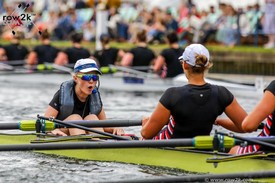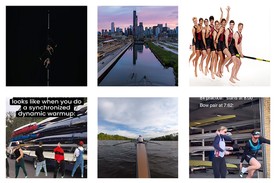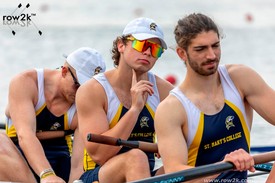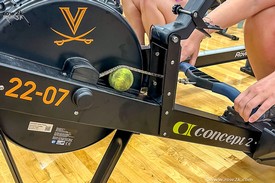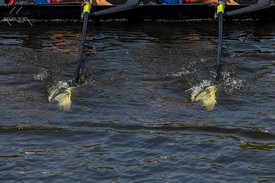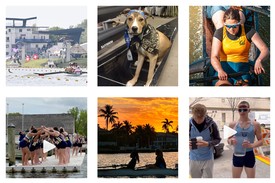row2k Interview with Marc Oria, US Coastal Coach - Part 1
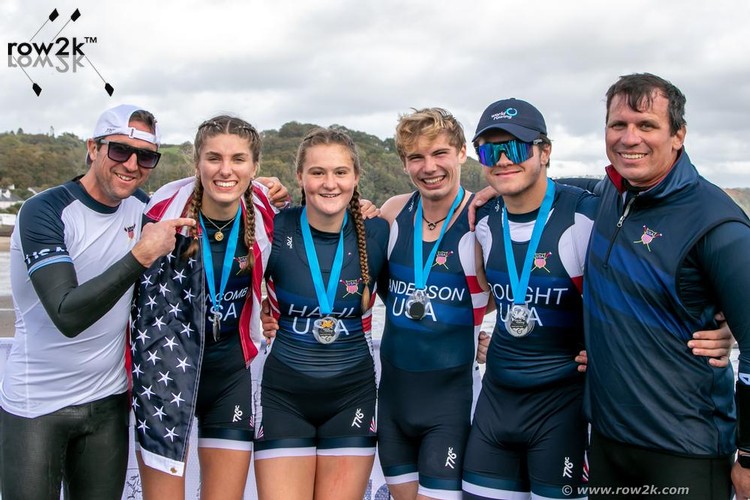
Ahead of this coming weekend's Beach Sprints Finals in Barletta, Italy, row2k caught up with Marc Oria, the coach of the US team and one of the leading advocates in the USA for coastal rowing.
In Part 1, Oria talks about what training athletes for coastal looks like, the changes he has seen over the three years that the US has been sending a team to Beach Sprints, the strengths of the US squad this year, and what he sees as the keys to--and challenges for--the growth of coastal in the United States.
Look for Part 2 tomorrow, where Oria talks about two of the returning medalists on this year's team: 2022 world champ Chris Bak and U19 bronze medalist Annelise Hahl.
With the addition of Beach Sprints in 2019, World Rowing's Coastal Championships became a two weekend event featuring two very different disciplines: the Beach Sprints format, which has been proposed for inclusion at the 2028 Olympics in Los Angeles, and the longer endurance distances contested at the Coastal Championships, where crews race between 4k and 6k in open water around a buoyed course.

Beach Sprints, in contrast to the endurance races which take place off shore, involves head-to-head races that start on the beach, with one member of each crew running to the boat, then rowing a slalom course to a turn buoy 250 meters from the surfline, before racing straight back to shore and sprinting out of the boat to the finish line.
In addition, the Beach Sprints Finals, by virtue of having been proposed by World Rowing as a new Olympic event, features national teams selected by each country's governing body, while the endurance coastal crews can be club teams, racing for their respective nations.
Last year, the US Beach Sprints team won five medals, including its first-ever gold when Chris Bak triumphed in the men's single, and had six crews make the 'Final Four' across the nine events. That medal tally put the USA third on the table behind Spain and Tunisia, and only Spain and Great Britain won as many medals as the US squad.
Spain ???? top the medal table at the 2022 World Rowing Beach Sprint Finals!#WRBeachSprints #WRBSF #BringOnTheWaves @wrcoastals22 pic.twitter.com/DoCdmykoLS
— World Rowing (@WorldRowing) October 16, 2022
Oria hopes to do even better in 2023, with seven athletes returning from that squad, and he also sees the possibility of the US winning its first medal in the coastal endurance events the following weekend.
We asked Oria, who coaches a number of the top US coastal athletes planning to compete in both disciplines this year, about the nature of the training for coastal racing compared to flat water rowing:
"In coastal, you have these two very opposite races. You have the Beach Sprints, which is the run, jump in a boat, do 250 meters, turn, another 250 meters, and run again, compared with endurance racing, doing 4k or 6k on a course with buoys in the open ocean. But the training plan doesn't change much. We still do the long pieces and the short pieces that we're doing in flat water, but what you change is adding all the technique for coastal rowing and the rigging for the boats.
"We change how we row a little, the technique in the boat. It's still rowing, but we change a little bit [for the water conditions]. Training for beach sprints also involves all the technical aspects of the running. We do a lot of drills from track and field. We do drills for more athleticism, for how to get into the boat.
"There's also the training with the boat handlers, because that's another part of the team when we're doing the beach sprints," Oria adds, referring to the support staff who stand in the surf and hold the boat and oars for the sprinting rower as they hop into the boat for the rowing potion of the race.

The Growing Interest in Coastal
Oria says that the biggest impact on the team since the USA's first Beach Sprints Finals appearance in 2021 has been the increase in the number of athletes interested in coastal rowing.
"Every year we have more athletes asking questions, more interest in races, and more athletes racing at Trials, which pushes the level of the team. We've gotten interest from athletes who were on the national team before, for flat water rowing, and that brings more competitiveness to the team and means people are more committed.
"The first year felt like we are trying this new thing, it's fun. The second year, in 2022, we had a bunch of athletes really committed and trying to make it happen, training for coastal all year, and some others who had not. Then this year, 2023, we have the same athletes from 2022 and just added more athletes like Christine Cavallo, who made the national team in flat water several times. These kind of athletes and that commitment, that's what is making the team even stronger and it's just a big difference."
According to Oria, that group of returners is the primary strength of the US team this year:
"We have a solid core of athletes, the majority of whom have qualified for a second year. From the 2022 team, we have Chris Bak, Kory Rogers, and Jeni Sorli on the senior team. We have Christine Cavallo again, who qualified in 2021 but was abroad in 2022. This core of athletes is making the team really strong, as are all the athletes surrounding them who didn't make the national team this year through Trials."

Four of the six junior athletes also return: Malachi Anderson, Annalie Duncomb, and Annelise Hahl are all medalists from 2022, and Britt Wotovich, a 2021 silver medalist, will make her third appearance.
Many of these athletes train year-round with Oria through Next Level Rowing, the high performance team Oria started last year to support athletes who want to focus on coastal, as well as those who want to do both coastal and flat water. Many of the Next Level Rowing athletes who did not make the beach sprints squad will compete at the endurance worlds this year, where it is possible to have multiple entries in each event.
"Honestly, we've been overwhelmed with the number of athletes knocking on the door to make the team. The sad part is we had to say no to some of the athletes, who were not ready because we don't have enough boats. We were scrambling around and moving boats all around the East Coast, just to be able to run the camps because we were completely overwhelmed with the number of athletes that we already have.
"Right now, we're being picky. We have a lot of athletes, but we want to start getting the best. In the end, it's a high performance team. That doesn't mean that we don't want to do development, but I think in the future we're going to create two different groups: the high performance team and the development team, then organize events for each separately."

Working with athletes coming into coastal with flat water racing experience has been an advantage for Oria and the other coastal coaches: "Knowing the basics makes a big difference. We don't have to teach these athletes how to row. It is just [teaching] the proper technique for coastal and the little tricks that work in coastal, for the conditions on the water--the swell, the wind--and for the equipment, which is different. We need to re-teach them new technique and give technical advice to these athletes, but they know how to row, they're used to the work outs. They know what an erg is, what lifts to do, so we just need to re-teach a few things."
Oria has also gotten a lot of interest from coxswains. This year's coxswain for Beach Sprints, Coral Kasden, coxed the men's eight at the 2019 Pan Am Games and the US women's eight at Henley in 2022.
Part of the appeal for coxswains, Oria says, lies in the fact that they get an expanded role in coastal racing:
"In the beach sprints, and in coastal as well though in a different way, the coxswain moves from being the person in a boat just giving you orders to becoming one of the most important parts of the team. The coxswain in the beach sprints quad runs and is part of the [crew's] time, then drives the boat along the buoy line, makes the turns, and makes the calls, so the coxswain is an athlete in that boat.

"It really tests the coxswains. When we did our tryouts, within the team, it was fascinating to see the coxswains competing with each other to be faster on the run, to get inside the boat faster, and to make the turns and the course better for the team. It really pushed them to the limit, and it was fascinating to observe."
Keys to Continued Development in Coastal
Oria sees creating more awareness about the opportunities in coastal rowing as key to its continued development in the States:
"We need to coach the coaches, and give more opportunities to people, both coaches and athletes, to try the sport. That will open up to the community what coastal rowing and beach sprints is. It's unfortunate, but I still have some coaches not willing to let their rowers try coastal because they think that they may miss half the season. I have had the experience of athletes saying my flat water coach won't allow me to do coastal, and that's sad."
"I really believe it's compatible and that's why I was invited to give a talk at the World Rowing coaches conference about making a training schedule which is fully compatible between flat water and coastal for the development of these athletes. World Rowing wants us to continue promoting that."

That was Oria's own experience, growing up in Spain, that coastal and flat water could support each other. There, athletes did both--and still do--transitioning seamlessly from flat water to coastal all the time.
"Usually we had nationals in June or July. Nationals was the last big flat water event and then we moved into open water, coastal rowing. It's just part of the training, and it's fun, it's outside.
"The big difference in Spain is that we have open water nationals in different boat classes. We have coastal races during the summer. We have Beach Sprints. They have a league now in Spain, so you have something fun to do during the summer, rather than sitting in a [flat water] boat that you would just be rowing in the whole year. So that's a big difference [from the US]."
Oria calls flat water and coastal "completely compatible," noting that, "World Rowing is trying to promote that, and all the Mediterranean countries continue to promote that. I'm not saying that it's resistance from the coaches, but it's that they don't really know what coastal is. I think USRowing, all the coaches, and World Rowing need to continue promoting coastal, for the health of the athletes, for the development of the athletes.
"That's one of the reasons I want to have athletes trialling for flat water and coastal at the same time," says Oria, and this year one of the medalists from the 2022 Beach Sprints, Annelise Hahl, won the U19 Trials in flat water and then represented the US in the single at the Junior Worlds in Paris. When Hahl also won the Beach Sprint Trials a few weeks later, earning a return spot in the U19 women's double with Annalie Duncomb, she became the first US athlete to make both a flat water and coastal national team in the same year.

When it comes to seeing how complimentary the two disciplines of the sport can be, Oria says that, "Annelise Hahl was extremely important for that purpose, showing that you can qualify and go to flat water worlds, and you can still do the summer national team in coastal. That's extremely important."
The Challenges and Hoped-for Changes Ahead
As a newer discipline in the sport for US rowers and clubs, the development of coastal rowing still faces hurdles as it grows, says Oria.
"The biggest challenge that we are having, and we didn't resolve it in 2023, is our infrastructure. There are no races. We don't have a calendar for Beach Sprints that we can offer. USRowing is willing to get more involved. We had several meetings with USRowing and I'm hopeful that in 2024 we will be able to start organizing some events. But [the infrastructure] is still very premature, because we don't have experience and expertise, and people don't know how to organize these events. We need people to have the opportunity to race and that will bring the team and the country to a much a higher level.
"Having a national championships, and not just trials, but a full schedule for coastal and beach sprints events would be a massive change."

"It would also be nice to have a training center. I know that the USA national team is going away from training centers now, but having a place where you can be sure that you have the boats and where the athletes can go and try the coastal boats would be a big change."
Creating centers with facilities and equipment for coastal is something Oria has started to do, both with Next Level Rowing in Cincinnati where he lives and works, and in Dartmouth, Massachusetts, where Ben Booth, another of the coastal team's coaches, lives.
"Boats are still a big challenge," Oria says, "but we can find more boats now. It's still very few, but we can have more programs. But the number of competitions is still low. We have Trials, but that's about it. That's why we go abroad. If I need to make them race, we do that racing outside [the US]."
This year that involved trips to Costa Rica and Peru, where Oria could combine training camps with racing opportunities, some of which included the races in Lima where Christine Cavallo and Kory Rogers qualified for the 2023 World Beach Games. While those Games were ultimately cancelled by the organizers in Indonesia, the qualification races provided the US athletes with added racing experience, to include an extra set of trials races this year in April which involved many of the senior members of the 2023 Beach Sprints Team.

Oria talked about the importance of that kind of experience for developing the watercraft skills needed to succeed in both coastal disciplines. Every skill the athletes learn, through experience, he says, is "a gain."
"The biggest issue that we have had is that we didn't have experience in coastal endurance before," Oria says, about why the US has yet to break into the medals in the longer races in the way that it has seen success already in Beach Sprints, but he says he is hopeful that the team now has the experience they need.
"I'm confident that this year it's time for us to get the first medal for the USA at the endurance Worlds. The main reason that we haven't yet is not because we don't have athletes strong enough to win a medal at the endurance distances. But now, we have athletes that have been racing for three years in the ocean. They've started feeling what it means to row in the ocean.
"There's only two ways to get those skills: you row with athletes who already have the skills so they can teach you or you gain that that experience by rowing in the ocean. We didn't have [enough of] that experience until this year.

"At Beach Sprints last year, we won five medals. I'm hopeful that we will gain more. That's your goal, as a coach, that we will do better than last year, but you never know. But I'm really hopeful that we will get at least one medal, if not more, at the endurance level for the USA."
Racing at the 2023 Beach Sprint Finals starts on Friday morning, with medal finals scheduled for Saturday and Sunday afternoon livestreamed on www.worldrowing.com. The endurance racing at Coastal Worlds begins a week later, with heats on Friday and Saturday, October 6th and 7th, and all medal finals on Sunday the 8th.
If you enjoy and rely on row2k, we need your help to be able to keep doing all this. Though row2k sometimes looks like a big, outside-funded operation, it mainly runs on enthusiasm and grit. Help us keep it coming, thank you! Learn more.
Comments | Log in to comment |
There are no Comments yet
| |
- Bont Rowing
- Calm Waters Rowing
- Concept 2
- Craftsbury Sculling
- The Crew Classic
- CrewLAB
- Croker
- Dad Vail Regatta
- Durham Boat Co.
- Empacher
- Faster Masters
- Filippi
- Fluidesign
- h2row.net
- HUDSON
- myrow
- Nielsen-Kellerman
- Oak Ridge RA
- Peinert Boat Works
- Pocock Racing Shells
- Race1 USA
- Rockland Rowing Masters Regatta
- RowKraft
- Rubini Jewelers
- Vespoli USA
- WinTech Racing
- Bont Rowing
- Calm Waters Rowing
- Concept 2
- Craftsbury Sculling
- The Crew Classic
- CrewLAB
- Croker
- Dad Vail Regatta
- Durham Boat Co.
- Empacher
- Faster Masters
- Filippi
- Fluidesign
- h2row.net
- HUDSON
- myrow
- Nielsen-Kellerman
- Oak Ridge RA
- Peinert Boat Works
- Pocock Racing Shells
- Race1 USA
- Rockland Rowing Masters Regatta
- RowKraft
- Rubini Jewelers
- Vespoli USA
- WinTech Racing



